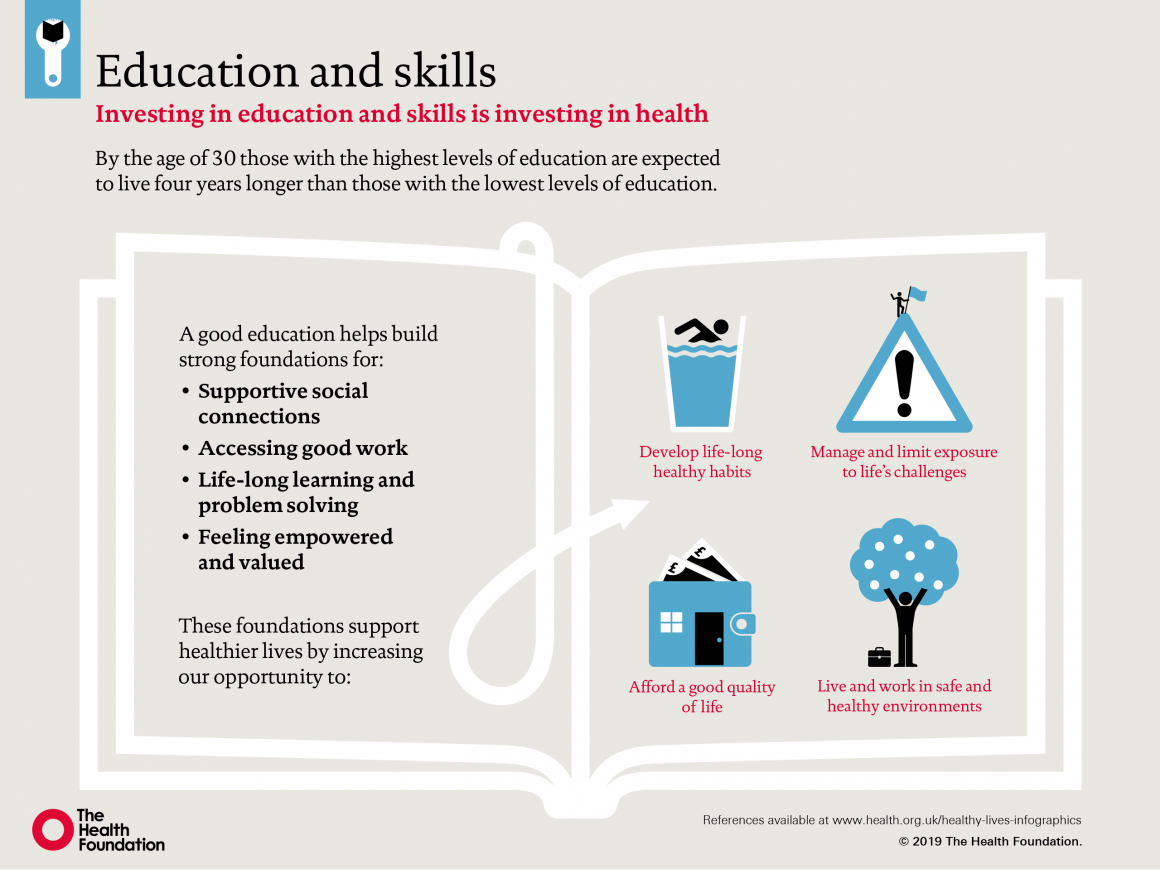How do our education and skills influence our health?
30 August 2017

This week in 1987 I was starting my first ‘proper’ job as a secondary school teacher in Oldham. Finding myself, 30 years on, writing an introduction to the Health Foundation’s new infographic on why education is good for your health feels a little like life has gone full circle.
The infographic illustrates the multiple ways in which our early education can shape the advantages and opportunities we do, or don't, encounter in our adult life, and why investing in education is widely seen as fundamental to building a flourishing society. A rounded education develops us as future citizens and equips us with the abilities and attributes that directly influence our long term health outcomes. Whether in terms of the nature of the work our qualifications enable us to pursue, or the life skills we learn that can help us navigate the challenges life throws at us.
We want our series of infographics to be a useful resource to help change the conversation about what makes us healthy. You are welcome to download, save and share them for education and non-commercial use. Please make sure that no modifications are made and that the Health Foundation and the source is clearly acknowledged in full.
If you have any further questions about using our resources in your work please get in touch at website@health.org.uk
Reading the background material we amassed in researching the infographic was like reading the health benefits of a wonder-drug. The contribution of education on long term health has been described in terms of:
- 'both potentiating and protective; it can trigger healthier futures, mitigate social stressors, and provide access to employment opportunities and life chances that could protect individuals from later-life disadvantage.'
- 'the single most important modifiable social determinant of health.'
And this isn’t just rhetoric. Studies show that the more educated and skilled you are, the more likely you will report better health even when compared with individuals with similar background characteristics.
I left teaching after a few years because I wanted to take up the opportunity to do a PhD (an example of taking my medicine perhaps?). This eventually led me to a career in what we call the ‘health’ sector. However, in the many conversations I have had with clinicians where they describe their daily encounters with the diseases of poverty and despair, I have often wondered whether I might have had more impact on people’s long term health if I had stayed in teaching.
Teachers (and all the people who work in schools) are part of the hidden public health workforce. As our infographic shows their endeavours aren’t just about producing GCSE certificates, but are critical to young people:
- developing supportive social connections
- accessing good work
- developing an aptitude for life-long learning and problem solving
- feeling empowered and valued.
These all have direct consequences on their long term health outcomes: whether through increasing someone’s likelihood of being able to afford a good quality life, or through better managing or being less exposed to life’s challenges.
The new school year starts this week. If this blog does reach anyone about to embark on a teaching career (or maybe even some established teachers looking for fresh inspiration), I would ask them to reflect on the profound impact they can have on young people’s lives. Maybe also think about the words of Aristotle who said, 'Those who educate children well are more to be honoured than they who produce them; for these only gave them life, those the art of living well.'
Jo Bibby is Director of Strategy at the Health Foundation, @JoBibbyTHF
References
- By the age of 30 those with the highest levels of education are expected to live four years longer than those with the lowest levels of education.
The OECD, Health at a Glance 2017: OECD Indicators Gap in life expectancy at age 30 between highest and lowest education level, by sex, 2015 (or nearest year), 2017.
Available from: www.oecd.org/health/health-systems/health-at-a-glance-19991312.htm
- The foundations and opportunities outlined in our infographic were developed using Figure 6 of Robert Wood Johnson Foundation's Education and Health report (2011).
- The healthy life expectancy figure is from a June 2017 report by the Office for National Statistics: An overview of lifestyles and wider characteristics linked to Healthy Life Expectancy in England.
Related blogs
Work with us
We look for talented and passionate individuals as everyone at the Health Foundation has an important role to play.
View current vacanciesThe Q community
Q is an initiative connecting people with improvement expertise across the UK.
Find out more


